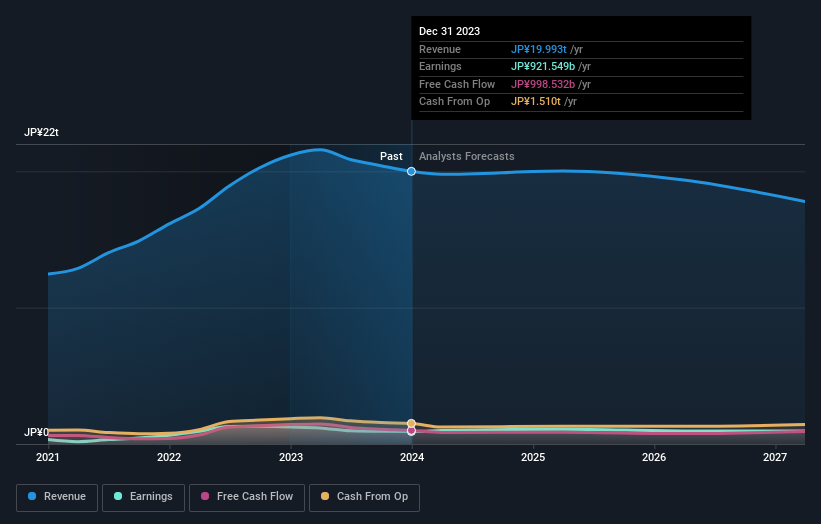Stock Analysis
- Japan
- /
- Trade Distributors
- /
- TSE:8058
Institutional investors are Mitsubishi Corporation's (TSE:8058) biggest bettors and were rewarded after last week's JP¥479b market cap gain

Key Insights
- Given the large stake in the stock by institutions, Mitsubishi's stock price might be vulnerable to their trading decisions
- A total of 23 investors have a majority stake in the company with 50% ownership
- Using data from analyst forecasts alongside ownership research, one can better assess the future performance of a company
To get a sense of who is truly in control of Mitsubishi Corporation (TSE:8058), it is important to understand the ownership structure of the business. With 54% stake, institutions possess the maximum shares in the company. That is, the group stands to benefit the most if the stock rises (or lose the most if there is a downturn).
And things are looking up for institutional investors after the company gained JP¥479b in market cap last week. One-year return to shareholders is currently 120% and last week’s gain was the icing on the cake.
Let's delve deeper into each type of owner of Mitsubishi, beginning with the chart below.
View our latest analysis for Mitsubishi

What Does The Institutional Ownership Tell Us About Mitsubishi?
Institutional investors commonly compare their own returns to the returns of a commonly followed index. So they generally do consider buying larger companies that are included in the relevant benchmark index.
As you can see, institutional investors have a fair amount of stake in Mitsubishi. This suggests some credibility amongst professional investors. But we can't rely on that fact alone since institutions make bad investments sometimes, just like everyone does. It is not uncommon to see a big share price drop if two large institutional investors try to sell out of a stock at the same time. So it is worth checking the past earnings trajectory of Mitsubishi, (below). Of course, keep in mind that there are other factors to consider, too.

Since institutional investors own more than half the issued stock, the board will likely have to pay attention to their preferences. Mitsubishi is not owned by hedge funds. New England Asset Management, Inc. is currently the company's largest shareholder with 8.7% of shares outstanding. With 6.6% and 4.3% of the shares outstanding respectively, BlackRock, Inc. and Meiji Yasuda Life Insurance Company, Asset Management Arm are the second and third largest shareholders.
Looking at the shareholder registry, we can see that 50% of the ownership is controlled by the top 23 shareholders, meaning that no single shareholder has a majority interest in the ownership.
Researching institutional ownership is a good way to gauge and filter a stock's expected performance. The same can be achieved by studying analyst sentiments. There are plenty of analysts covering the stock, so it might be worth seeing what they are forecasting, too.
Insider Ownership Of Mitsubishi
While the precise definition of an insider can be subjective, almost everyone considers board members to be insiders. Management ultimately answers to the board. However, it is not uncommon for managers to be executive board members, especially if they are a founder or the CEO.
Most consider insider ownership a positive because it can indicate the board is well aligned with other shareholders. However, on some occasions too much power is concentrated within this group.
Our information suggests that Mitsubishi Corporation insiders own under 1% of the company. As it is a large company, we'd only expect insiders to own a small percentage of it. But it's worth noting that they own JP¥5.9b worth of shares. Arguably recent buying and selling is just as important to consider. You can click here to see if insiders have been buying or selling.
General Public Ownership
With a 46% ownership, the general public, mostly comprising of individual investors, have some degree of sway over Mitsubishi. This size of ownership, while considerable, may not be enough to change company policy if the decision is not in sync with other large shareholders.
Next Steps:
It's always worth thinking about the different groups who own shares in a company. But to understand Mitsubishi better, we need to consider many other factors.
I always like to check for a history of revenue growth. You can too, by accessing this free chart of historic revenue and earnings in this detailed graph.
Ultimately the future is most important. You can access this free report on analyst forecasts for the company.
NB: Figures in this article are calculated using data from the last twelve months, which refer to the 12-month period ending on the last date of the month the financial statement is dated. This may not be consistent with full year annual report figures.
Valuation is complex, but we're helping make it simple.
Find out whether Mitsubishi is potentially over or undervalued by checking out our comprehensive analysis, which includes fair value estimates, risks and warnings, dividends, insider transactions and financial health.
View the Free AnalysisHave feedback on this article? Concerned about the content? Get in touch with us directly. Alternatively, email editorial-team (at) simplywallst.com.
This article by Simply Wall St is general in nature. We provide commentary based on historical data and analyst forecasts only using an unbiased methodology and our articles are not intended to be financial advice. It does not constitute a recommendation to buy or sell any stock, and does not take account of your objectives, or your financial situation. We aim to bring you long-term focused analysis driven by fundamental data. Note that our analysis may not factor in the latest price-sensitive company announcements or qualitative material. Simply Wall St has no position in any stocks mentioned.
About TSE:8058
Mitsubishi
Mitsubishi Corporation engages in the natural gas, industrial materials and infrastructure, petroleum and chemicals, mineral resources, automotive and mobility, food and consumer industry, power solution, and urban development businesses worldwide.
Flawless balance sheet average dividend payer.

